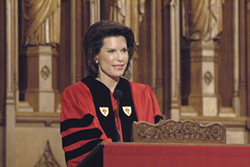Nancy Goodman Brinker inspires baccalaureate celebrants
Tells graduates to find a passion and pursue it with reckless abandon

A fanfare from the Majestic Brass Quintet filled Marsh Chapel on Sunday morning as families, including a smattering of early-rising graduates, gratefully filed in from the monsoonlike conditions outside. Cameras flashed as the celebrants, led by Marsh Chapel Dean Robert C. Neville and the red-robed Marsh Chapel Choir, marched to the altar to begin the 2006 Boston University Baccalaureate Service.
In a first reading apropos of both Commencement Day and the raw weather that accompanied it, Boston University president Robert Brown read the well-known passage from Ecclesiastes that begins, “For everything there is a season.”
Brown later introduced the baccalaureate speaker, Nancy Goodman Brinker, founder of the Susan G. Komen Breast Cancer Foundation.
Brinker established her foundation in 1982, two years after her older sister, Susan, died of breast cancer. She began with only $200 and a shoe box filled with the names of people who might lend a hand. The foundation now has more than 75,000 volunteers and has raised $750 million for breast cancer research, education, and treatment. The foundation’s signature fund-raising event, the Komen Race for the Cure, a 5K run and walk, first occurred in 1983 with just 800 participants. Today the event takes place in more than 180 cities, drawing 1.7 million participants.
Brinker, herself a breast cancer survivor, counseled the graduates in the audience to live their lives with passion, stewardship, perseverance, and integrity. She noted that these four principles have guided her life and a career dedicated to fulfilling a promise she made to Susan before her sister died.
“We’ve got to do something to help other women,” Susan had told her. “I want you to do everything you can to cure this disease.”
Brinker promised she would try, and this vow has since defined her life’s passion and purpose. She urged the audience to devote themselves to their own callings with similar fervor.
“Life is too short to waste on pursuits you don’t care about,” Brinker told the graduates. “If it’s not your passion, don’t do it. But once you find your passion, pursue it with reckless abandon.”
Brinker added that this passion should be imbued with a sense of stewardship, and noted her family’s Jewish heritage with its concept of tikkun olam, the idea that “each of us [can] repair the world around us."
"In our lives, we are called upon to be stewards, to be agents of change, to make a difference,” said Brinker, pointing out that making that difference is not always easy. “Failure has been a constant companion,” Brinker acknowledged, referring to the early years of the Komen foundation, “when people didn’t want to hear the words ‘breast cancer.’” Brinker admitted that when she began her foundation, she believed that it might accomplish its goal of eradicating breast cancer in just ten years.
“I never thought we’d still be fighting this, as hard as we are, 30 years later,” admitted Brinker. But she has learned perseverance, and she passed on this lesson to the audience. “Tune out the detractors and the doubters,” she advised. “It may make you lonely at times, but persevere, and it will make you exceptional.”
Brinker described integrity, honesty, and reputation as “those high and inconvenient hills” graduates would face down the road. “Your integrity is your single most valuable asset,” she cautioned. “Nothing, no dollar amount is worth the trade.”
Brinker closed her address with the story of an event she organized in Hungary, where she served as U.S. ambassador from 2001 until 2003. The event was a march of breast cancer survivors in Budapest, marchers who, Brinker said, gave “a face and a voice to a disease that [in Hungary] was never discussed.”
One of the marchers worried aloud that their demonstration might not have been enough of a statement and that perhaps they had not been “brave enough.” But Brinker noted that since that event the percentage of Hungarian women screened for breast cancer has “skyrocketed” and the death rate has begun to decline.
“So this morning,” said Brinker, “we ask for guidance and strength to be brave enough to find a passion that gives our hearts fulfillment. We ask to be brave enough to remember that we can and must be stewards and repair the world, and we must be brave enough to persevere, and let us be brave enough to resist the inevitable temptations to our integrity and reputation. . . . Congratulations to all the graduates. I wish you a life of meaning, passion, stewardship, perseverance, and joy, and love.”